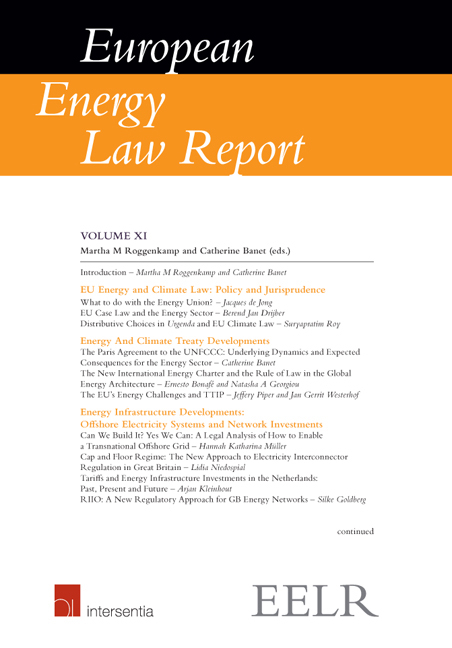Book contents
- Frontmatter
- Editorial
- Contents
- List of Abbreviations
- List of Contributors
- Introduction
- Part I EU Energy and Climate Law: Policy and Jurisprudence
- Part II Energy and Climate Treaty Developments
- Part III Energy Infrastructure Developments: Offshore Electricity Systems and Network Investments
- Part IV Heat Supply Legislation in the Eu
- Part V Security of Energy Supply and Safety
- Chapter XIV Shale Gas and the EU
- Chapter XV Reducing Gas Production from the Groningen Field: The Need to Balance Safe Production with Supply Security
Chapter XVI - Regulating Security of Energy Supply for End Consumers: A Comparative Overview
from Part V - Security of Energy Supply and Safety
Published online by Cambridge University Press: 29 September 2018
- Frontmatter
- Editorial
- Contents
- List of Abbreviations
- List of Contributors
- Introduction
- Part I EU Energy and Climate Law: Policy and Jurisprudence
- Part II Energy and Climate Treaty Developments
- Part III Energy Infrastructure Developments: Offshore Electricity Systems and Network Investments
- Part IV Heat Supply Legislation in the Eu
- Part V Security of Energy Supply and Safety
- Chapter XIV Shale Gas and the EU
- Chapter XV Reducing Gas Production from the Groningen Field: The Need to Balance Safe Production with Supply Security
Summary
INTRODUCTION
The liberalization of the energy sector has had and is continuing to have a major impact on the energy consumer. As of 2007, all energy consumers have the freedom to choose an energy supplier. Operating in a liberalized market, the energy suppliers need to compete with each other by offering, for example, lower prices and better or other services. Generally, in the European Union (EU) the number of suppliers increased. Larger and smaller suppliers are competing for the energy consumer. However, liberalized markets could show their downside. By offering low energy prices for the end consumer with long-term supply contracts while depending on its own energy sourcing with fluctuating trade and wholesale prices, an energy supplier could face its bankruptcy as a couple of cases in the EU Member States show. This may not only be detrimental to the end consumer but also to the other energy market parties like transmission system operators (TSOs), distribution system operators (DSOs), other suppliers and balance responsible parties. As the security and continuity of energy supply for, in particular, household consumers (citizens) is considered to be a major topic, the question arises whether the end consumers and the energy markets generally should be given some sort of legal protection in case of an energy supplier going bankrupt or otherwise failing. Although EU law provides for the appointment of a so-called Supplier of Last Resort (SoLR), it is at the discretion of EU Member States whether or not to make SoLR arrangements. The appointment of an SoLR is therefore certainly not cast in stone.
This chapter looks at the SoLR procedures of four EU Member States, namely, Belgium, Germany, the Netherlands and the United Kingdom. Section 2 examines the EU legal framework for appointing a SoLR. With regard to the four EU Member States, Sections 3, 4, 5 and 6 each start with a general introduction, then give an overview of the applicable SoLR procedures and end with a recent case. In the Netherlands, a SoLR can also be a third party acting as a balance responsible party. For comparison purposes, the role of balance responsibility parties is briefly mentioned also for Belgium, Germany and the United Kingdom. Section 7 concludes with some observations on the SolR measures applied by these EU Member States.
EU LEGAL FRAMEWORK
Under EU law the appointment of an SoLR is not mandatory.
- Type
- Chapter
- Information
- European Energy Law Report XI , pp. 317 - 345Publisher: IntersentiaPrint publication year: 2017



